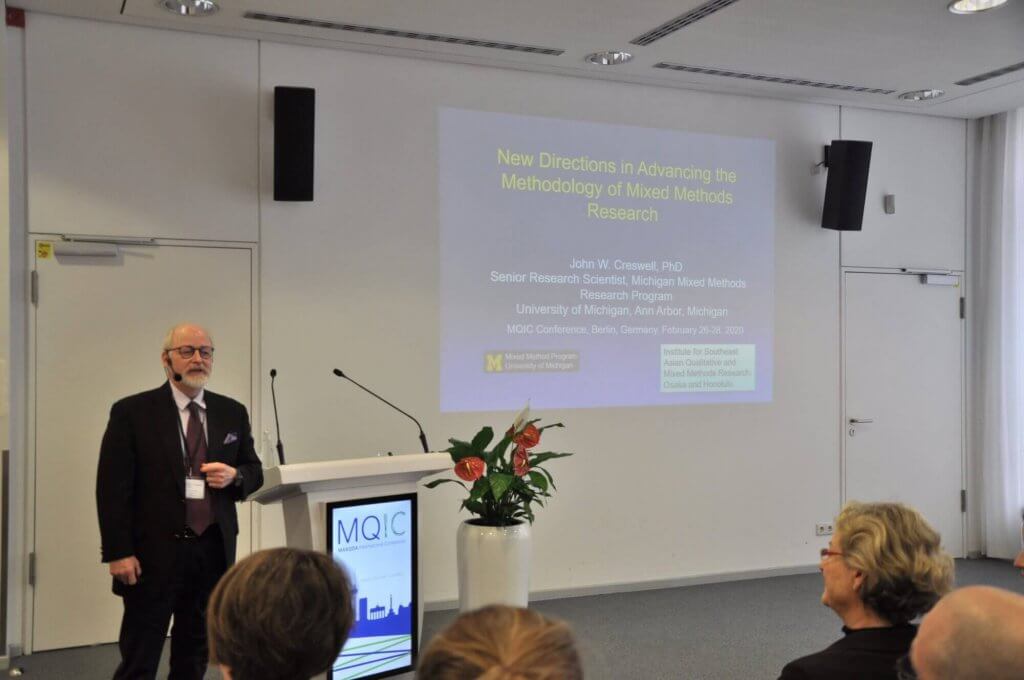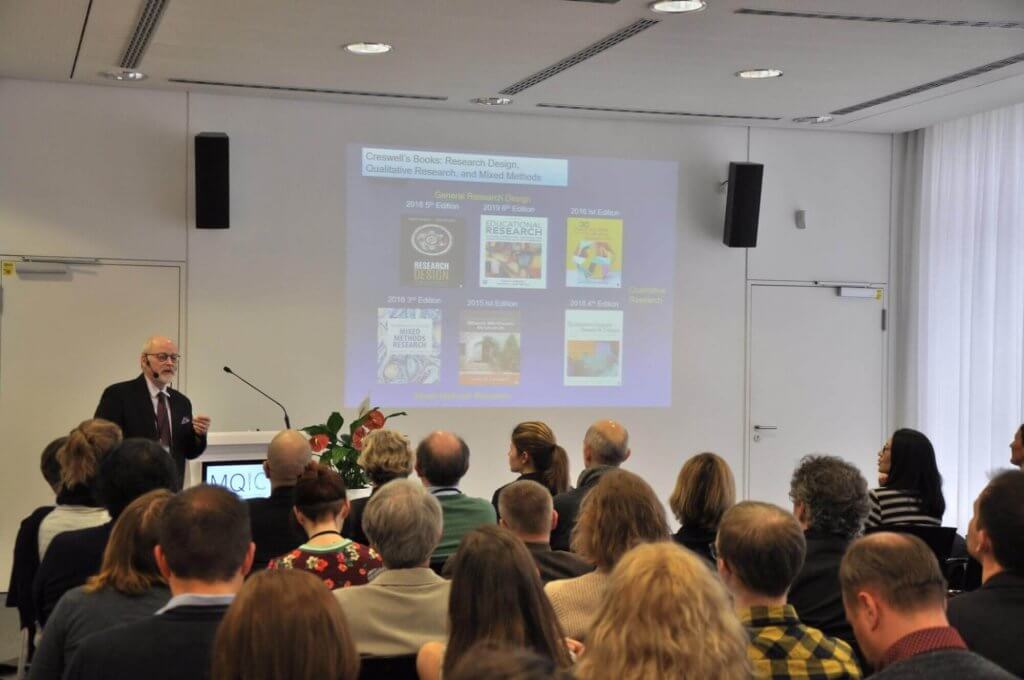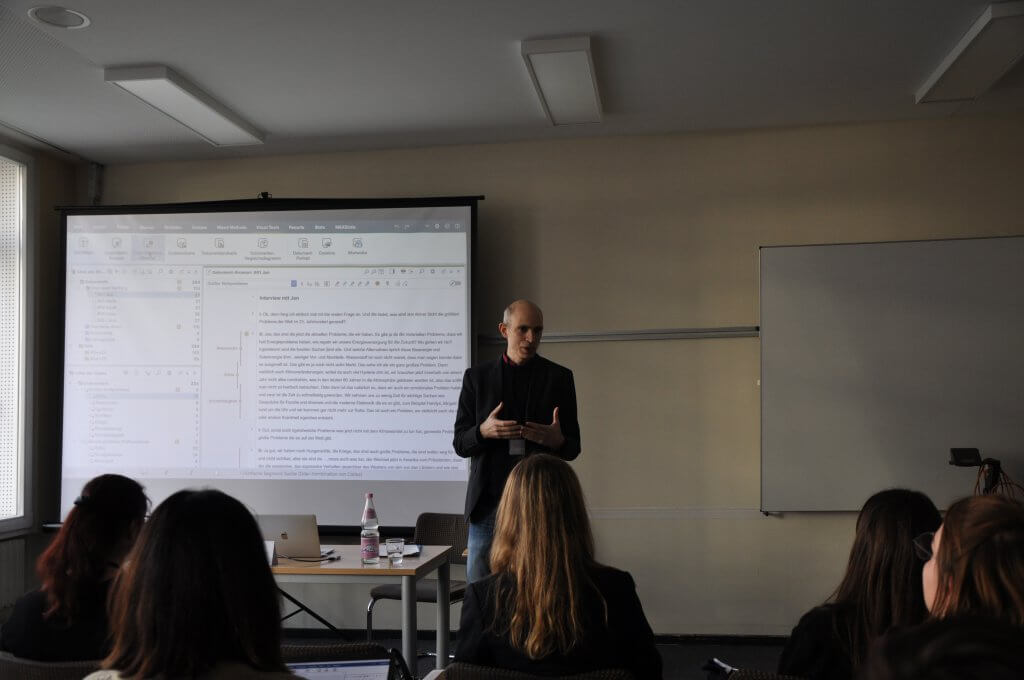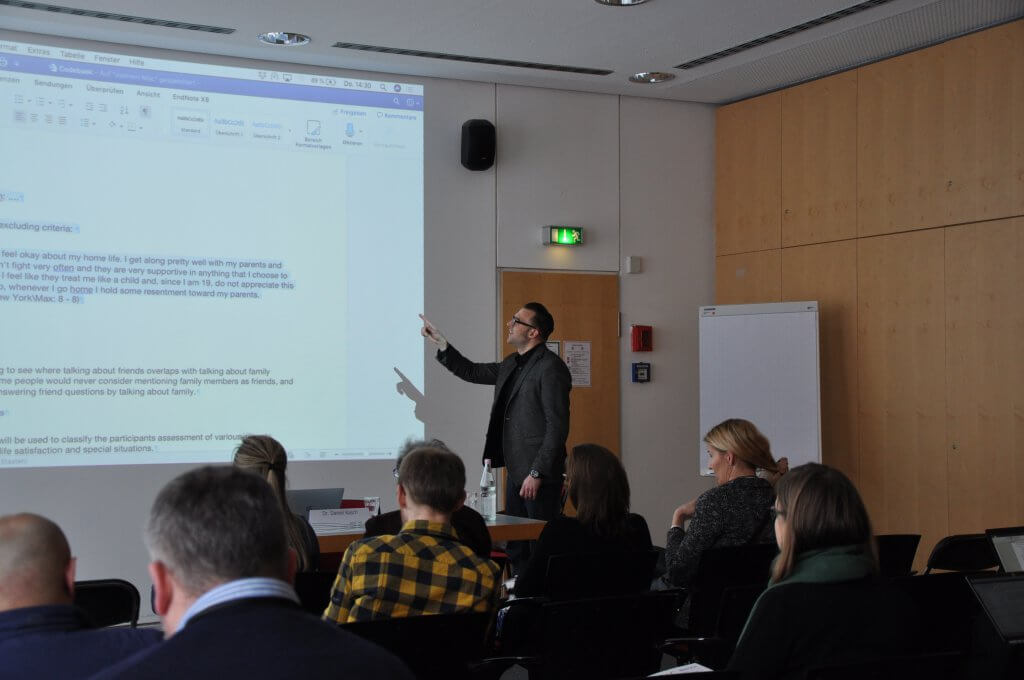This year’s MAXQDA International Conference (MQIC) was our biggest conference yet – with 175 participants from 28 countries, representing 12 disciplines! Though it was the 22nd user conference, in a way it was a conference of firsts. It is the first time that we have had to close the registration 2 weeks ahead of the conference due to high demand. It was also the first time that we sold out the conference’s Special Event, had more than 30 poster submissions, and that the Keynote Address filled not one, but two rooms with attendees!
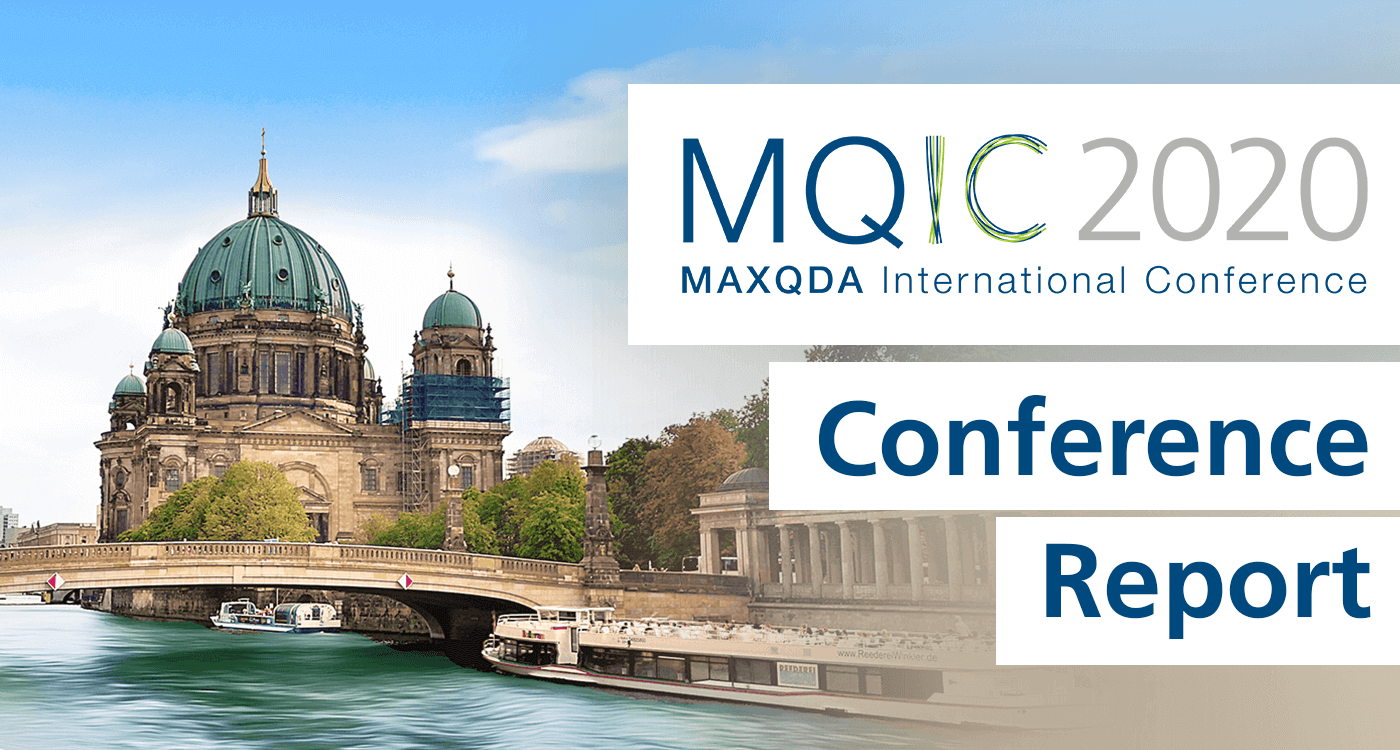
The conference schedule was also packed with learning and networking sessions, offering participants a choice of 30 Spotlight Sessions, 18 workshops, 5 Best Practice Roundtables, 3 networking events, 1 Keynote, and a Poster Session (displaying 21 unique posters and awarding 4 cash prizes) – all of that in just 3 days!
Welcoming Address
The MQIC opened with a Welcoming Address by Isabel Kuckartz (COO, VERBI Software) and Julia Gerson (CPO, VERBI Software) where participants were able to gain insights into our software’s journey, the company that develops MAXQDA, and the ever-growing community of MAXQDA users around the globe.
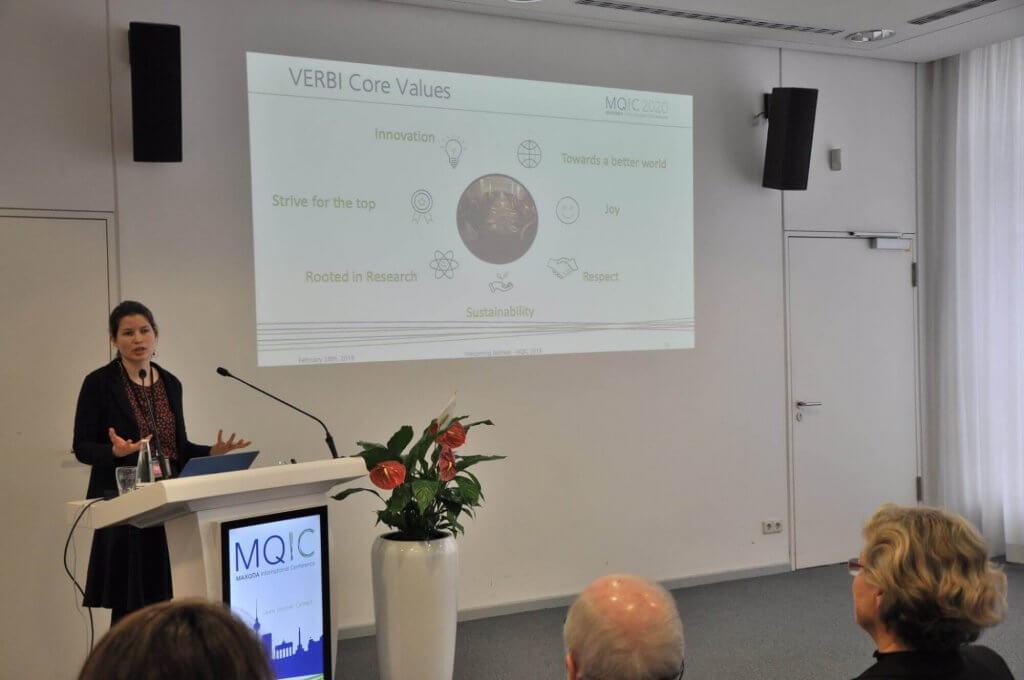
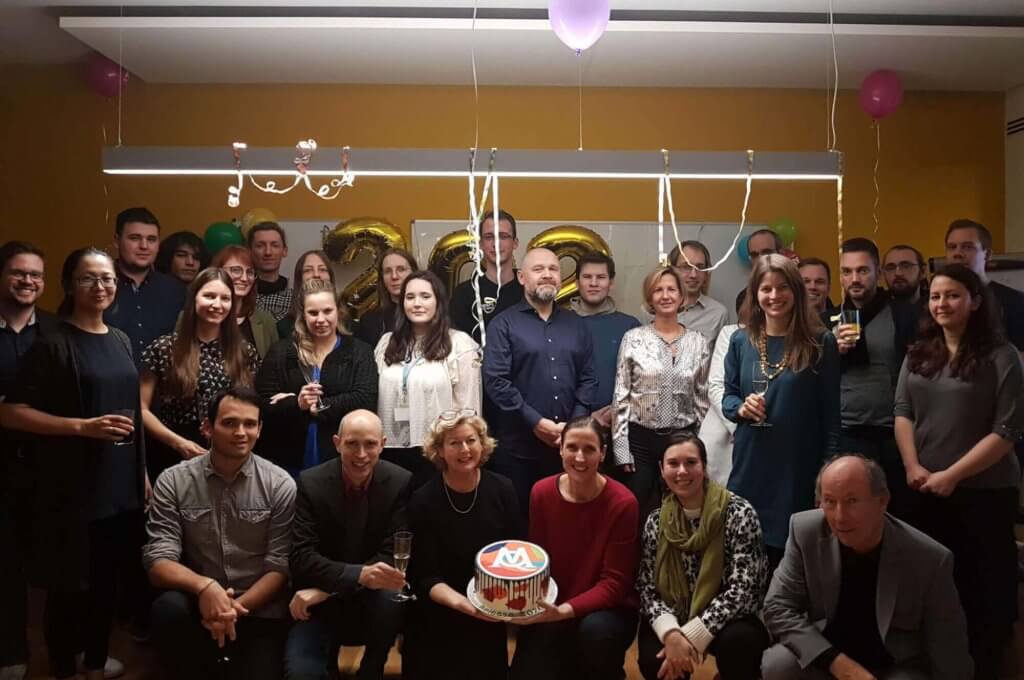
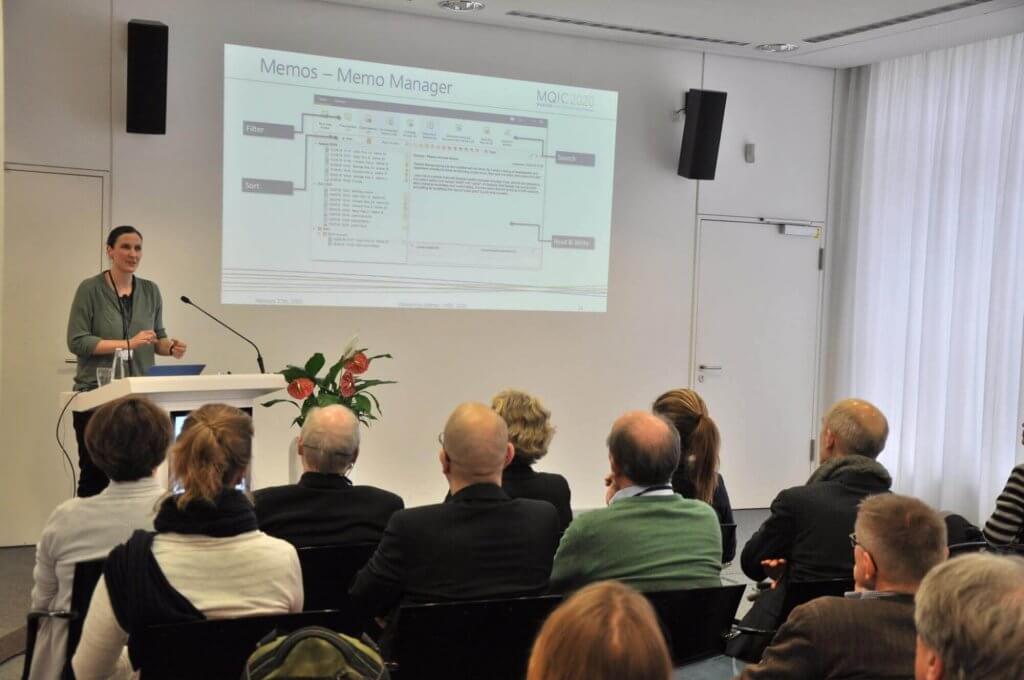
Welcoming Address by Isabel Kuckartz (left) and Julia Gerson (right),
including photos from the MAXQDA 2020 launch (center)
At VERBI Software, we’ve had plenty of reasons to celebrate over the last months. The biggest event of the year was the release of MAXQDA 2020 – the latest version of MAXQDA with more than 70 new features. We’ve also moved into a beautiful and larger office, located next to Berlin Central Station, and our community of MAXQDA users continues to grow!
The MAXQDA Community
Isabel Kuckartz, Chief Operations Officer at VERBI, took a moment to share, that one of our trainers Karen Andes, who was at the conference, is about launch her Coursera course called “Teaching QA”– and, of course, she will be using MAXQDA! We are very excited about the launch and hope that you will take part.
In fact, there are now 156 active Professional MAXQDA Trainers all over the world who conduct software training sessions, hold methods courses, and offer consulting services to other researchers, just to name a few. Without our amazing trainer network, it would not be possible to organize a conference with such a strong focus on hands-on MAXQDA training, such as the MQIC!
Our Research Network has also grown, and we now have 485 active members. 31 of these members have even submitted guest articles right here in the MAXQDA Research Blog. If you are interested in sharing your research with our world-wide community, you are more than welcome to do so! Please send us an e-mail with a short abstract (ca. 200 words) about your research and we will be happy to help you further. If you are interested in joining the MAXQDA Research Network as well, please click here:
VERBI Software’s Core Company Values
Isabel also introduced one of VERBI’s big projects completed this year, which was to define core values for us as a team. We came up with these 7 core company values:
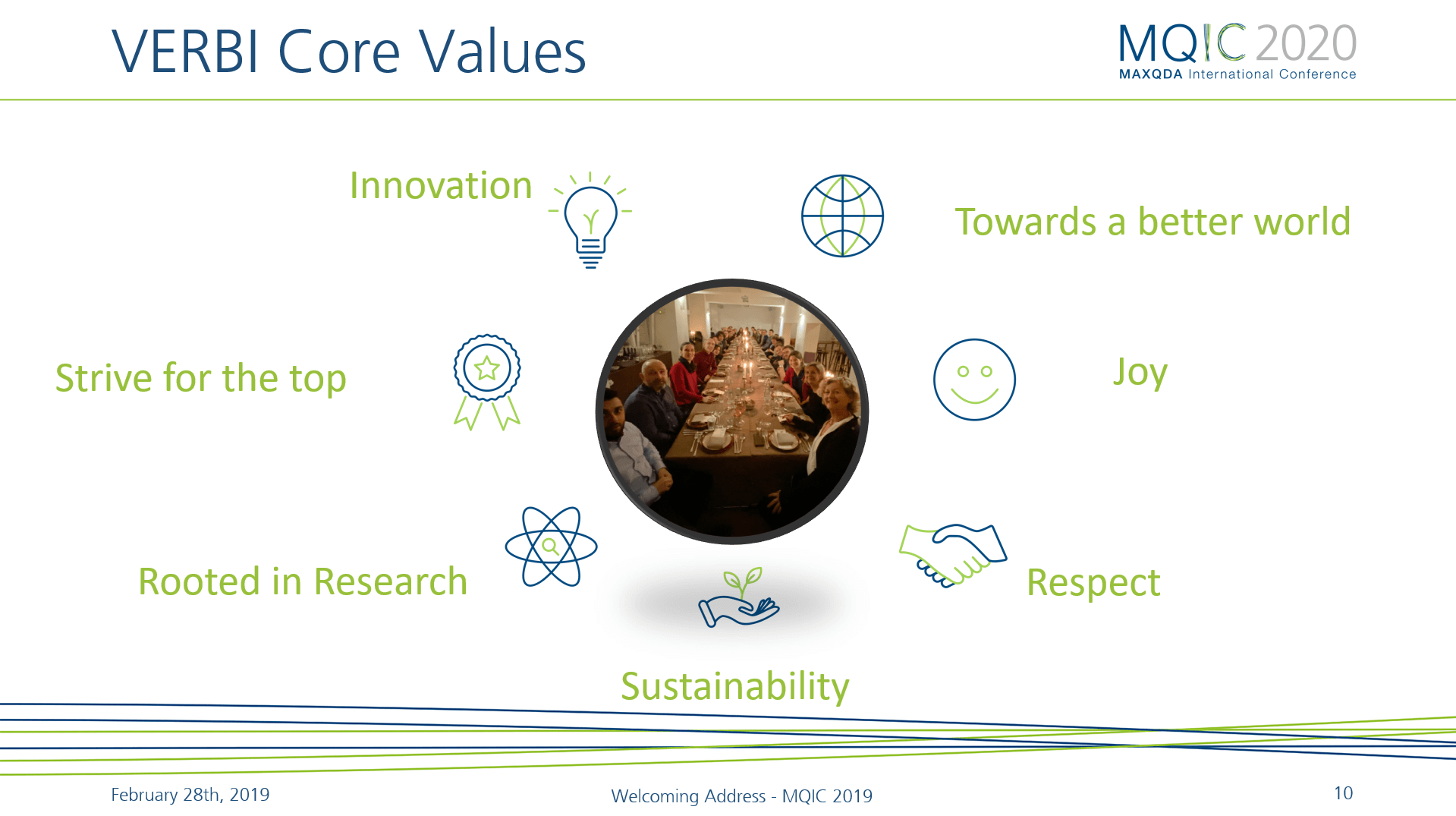
VERBI Software’s Core Company Values
One of the most important points for VERBI Software, as a company, is that we believe in quality. It is not just about being a market leader, but about providing the best product for qualitative and mixed methods researchers. This ethos is reflected in the value we named, Strive to the Top. She also stated:
“We want to have steady and sustainable growth. We have a great team working daily to make the software even better, to provide even better support, to offer more training materials, and most importantly: we have an incredible, strong, and unique community we can count on. That’s you – everyone here; every single trainer, partner, or those who of you involved in our research network. We believe that exchange and active discussion with users, trainers, and researchers are extremely important to the development of both MAXQDA and VERBI. And that brings us to our value, Rooted in Research.”
Finally, as some of you know – VERBI is a family-run business. Our core value “sustainability” is thus not only related to the ecological sense (such as that we are striving to become a paperless office) but we also want to remain a family business, and we want to offer the best workplace possible for our team. In fact, aligned with these core values, this year’s MAXQDA Research Grants theme is sustainability and sustainable development!
The New MAXQDA 2020
Julia Gerson, Chief Product Officer at VERBI, then took over the mic to present several new features in MAXQDA 2020, which was launched in November. MAXQDA 2020 is the result of more than 30 years of innovation – it is the 12th version of our software and because more than 70 new features would be way too many to show us in just a few minutes, Julia narrowed it down and took us on a tour of a few of the bigger changes found in MAXQDA 2020.
Starting with the interface, Julia pointed out several improvements, including that overall we removed as much visual clutter as possible and added white space which makes the interface much more visually appealing and comfortable to work with. Did you know that each of the four windows now has its own settings menu too (see screenshot below)?
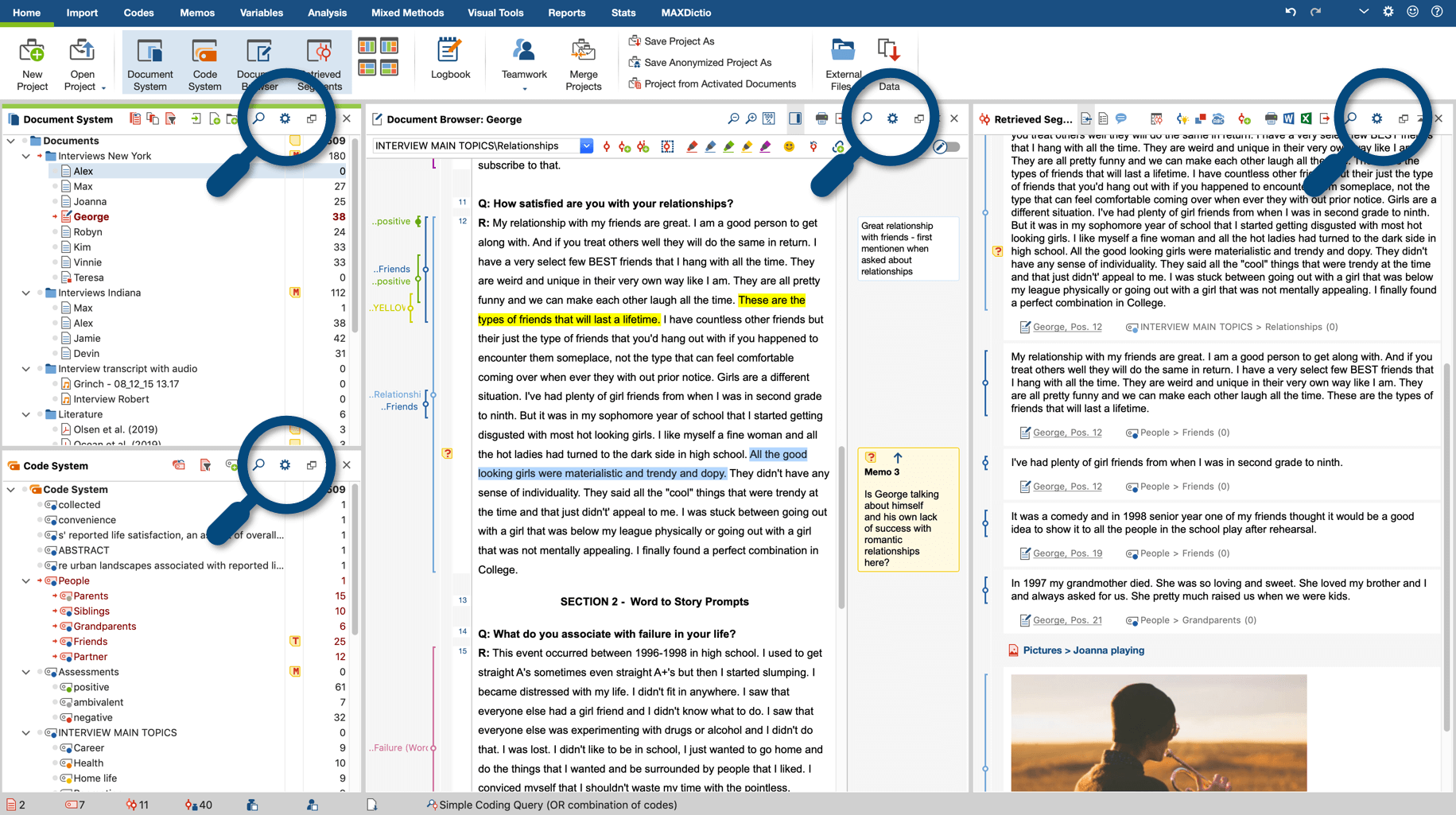
MAXQDA 2020 interface showing the new settings menu
Next, One of the biggest changes to MAXQDA 2020 was the introduction of the Memo Manager! The new Memo Manager takes working with memos to a new and much more comfortable level as it basically turns your memos into a complete project knowledge base. Julia also presented the new and improved MAXMaps. The new MAXMaps now looks and works similarly to Microsoft Office tools, making the features more familiar and easy-to-use than ever before.
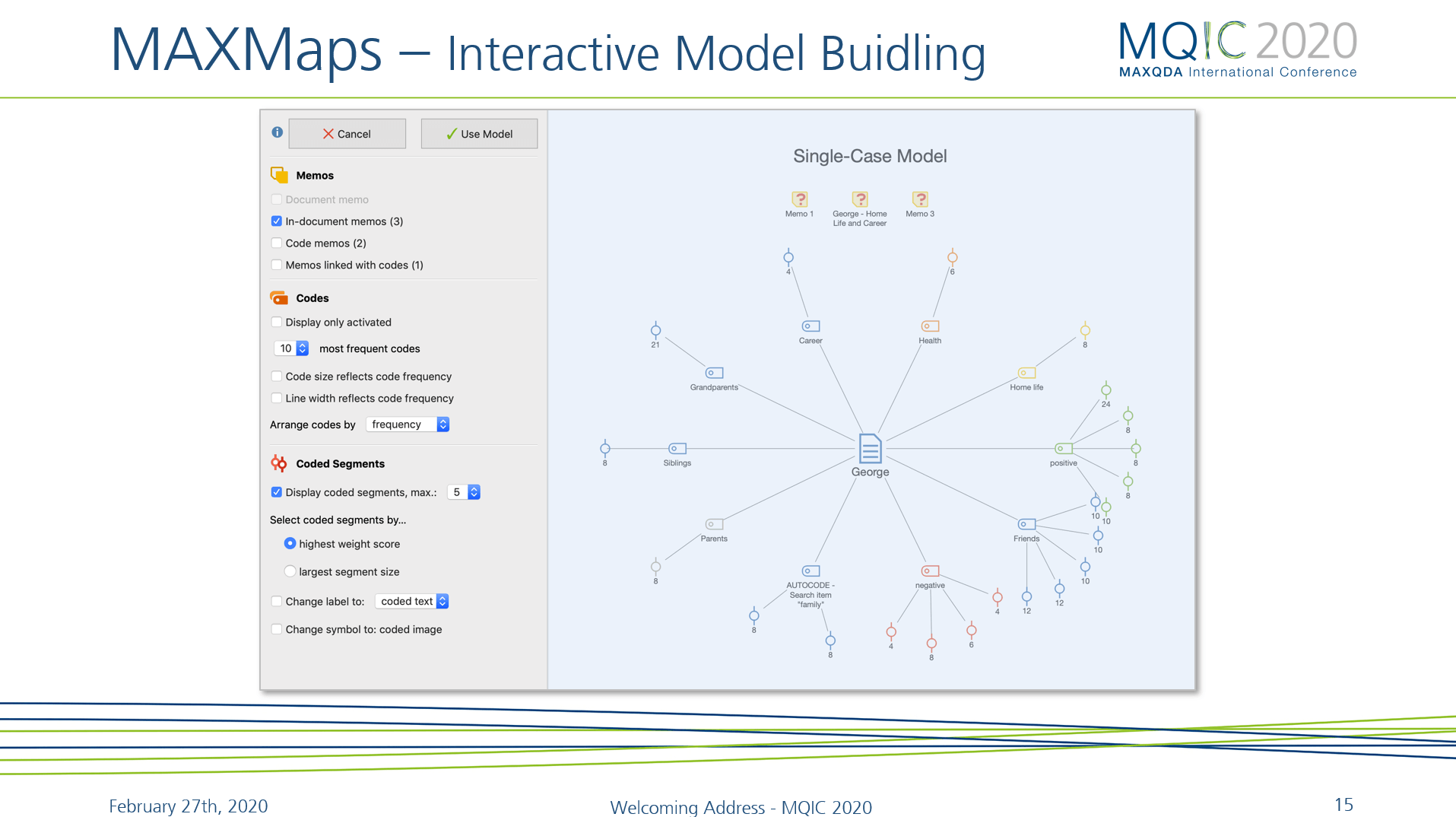
MAXQDA 2020 MAXMaps feature
If you take a look at this year’s posters outside you will see a lot of examples of how Maps can be used in research projects. Furthermore, using templates is now much more user-friendly and fun (see screenshot above). Julia stated:
In 2018, using a template meant selecting one of several options, then looking at an option window like this to setting up the map as you think you wanted it, clicking OK, looking at the finished map and thinking, urgh… almost, but that’s not quite it yet. So then you redo it once, twice or several times until the outcome is perfect. MAXQDA 2020 makes your life a whole lot easier by making this process interactive. All the model options can now be previewed to show you what the final product will look like before you create the map.
Finally, Julia discussed the new import and export options, including the one-click Archive Data function. Sharing your data for teamwork, publication, and reuse has never been easier! To see all the new options, click here to visit the MAXQDA 2020 manual, now with individual chapters available as downloadable PDFs:
Keynote Address
The MQIC 2020 Keynote Address was delivered by John W. Creswell, Ph.D., Professor of family medicine and co-director of the Michigan Mixed Methods Program at the University of Michigan.
Anne Kuckartz, CEO of VERBI Software, introduced Dr. Creswell by stating that mixed methods bridges the qual/quant gap in research and is the key to constructively working together. She then gave the floor to Dr. Creswell, who has been a pioneer in the field since its very inception in the 1980s.
“New Directions in Advancing the Methodology of Mixed Methods Research”
by John W. Creswell, Ph.D.
The aim of Dr. Creswell’s presentation was to give the audience both an overview of what mixed methods research is and then present procedures that they could use in their own studies, including a look back at the history of mixed methods and some practical examples from today.
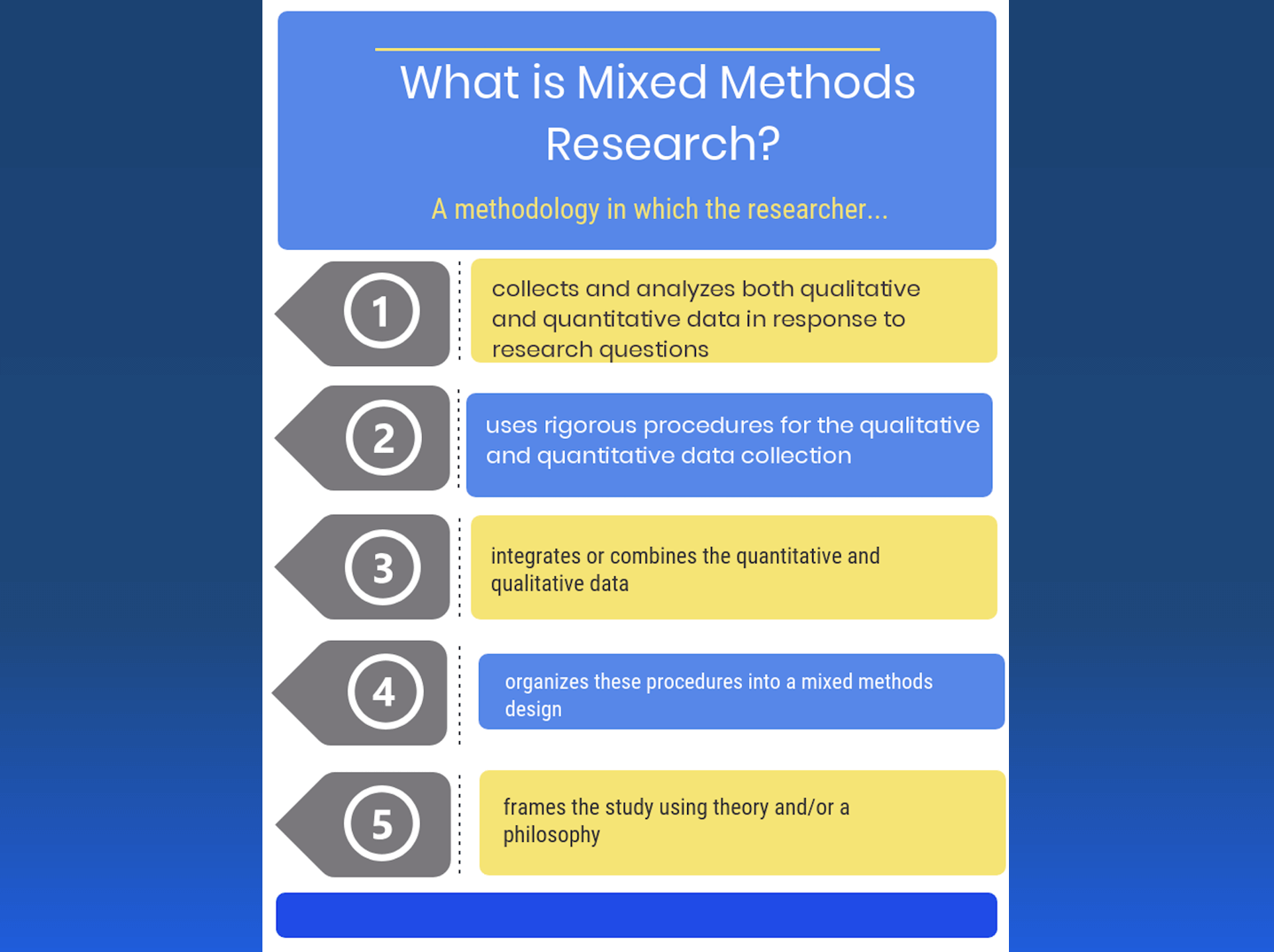
Mixed methods research definition by John W. Creswell, PhD
Dr. Creswell defined the Three Key Ideas to Understand Mixed Methods Research: “We will integrate or mix the data; We use mixed methods designs to integrate the data; and from this integration, we obtain insights or meta-inferences beyond what we learn from either our quantitative and qualitative data”, followed by nine excellent procedural tips for any researcher seeking to build innovative features into their project and have stronger projects for submission:
- Identify and label your mixed methods design
- Include a diagram of your mixed methods design
- Consider using an implementation matrix
- Reinforce integration
- Develop a data table
- Use rigorous procedures
- Create a joint display to show integration
- Include a mixed methods study aim
- Add a conceptual framework into your design
Next, the researcher must decide what kind of design they will use for their mixed methods research project. He presented two categories of mixed methods designs: Core and Complex, as well as their subcategories: Convergent, Explanatory Sequential, and Exploratory Sequential Designs for Core Mixed Methods Designs, and Intervention Trials, Multiple Case Study, Program Evaluation, and CBPR Participatory Studies, for Complex Designs that include Core Designs. Make sure to take a look at the presentation slides below to get a full overview of each design!
Download Presentation Slides (PDF)
As you will also see in the PowerPoint, Dr. Creswell did an excellent job of demonstrating the importance of diagrams in mixed methods designs, stating that they help the researcher simplify the complex procedures of mixed methods so that their design can be understood by a reader. The great news is that, as we saw above in Julia Gerson’s speech, MAXMaps is the perfect tool to help you create diagrams based directly on your research! In fact, every element in your map is interactive, meaning that you can find the source in your MAXQDA project with just one click.
Furthermore, Dr. Creswell reiterated how CAQDAS is an exciting new adventure for mixed methods, with MAXQDA acting as an industry leader of bringing mixed methods to the forefront in the software. In fact, MAXQDA is the leading QDA software with such a prominent and sophisticated mixed methods menu!
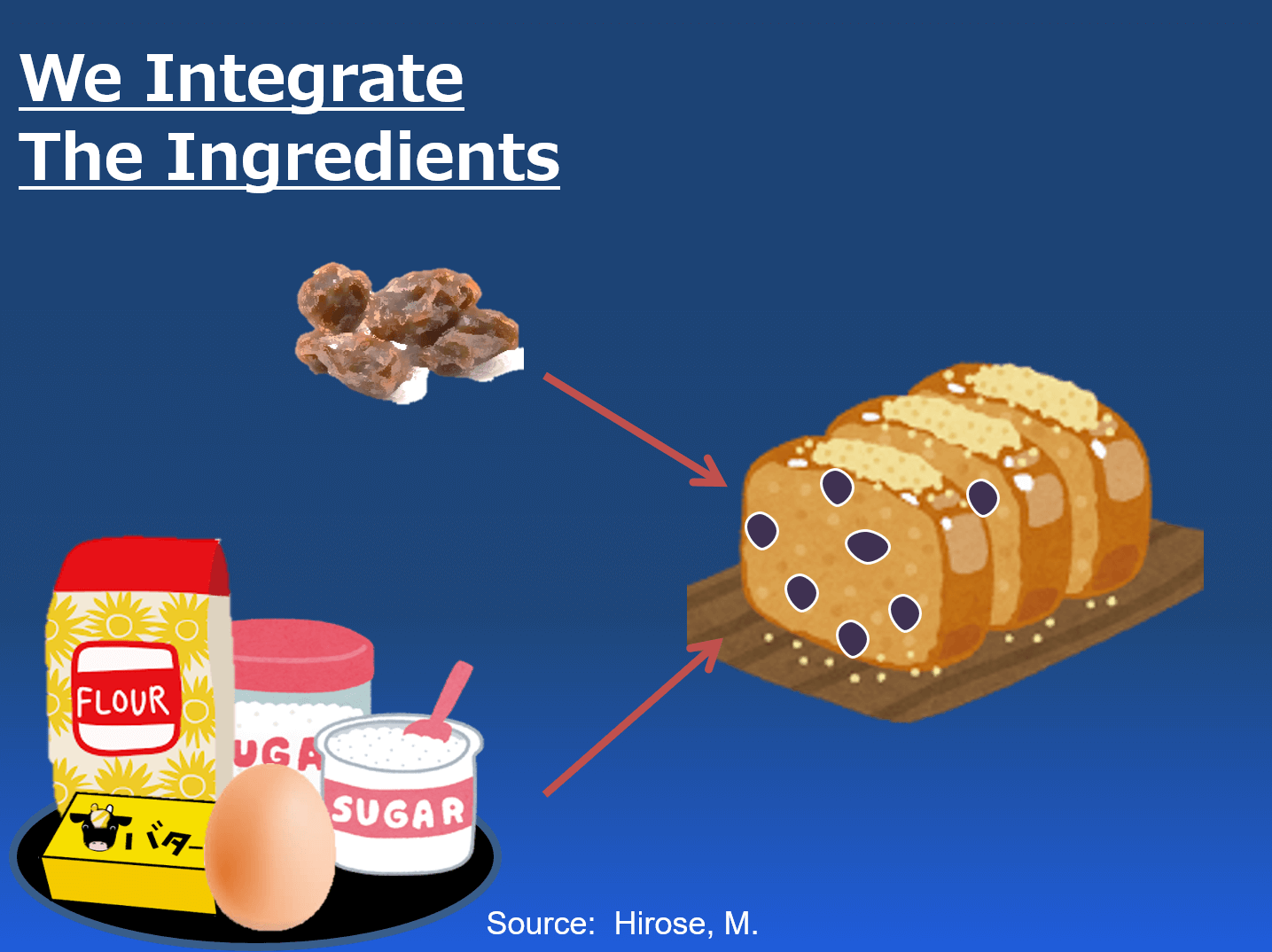
Data integration concepts by Mariko Hirose, PhD
presented by John W. Creswell, PhD
In conclusion, Dr. Creswell challenged us to remember the importance of research design; to reinforce the integration of our data; to uphold industry standards; and to be rigorous with our data. He also suggested that everyone at the keynote look into integrating mixed methods into their next research project and then present a poster at the next MQIC, which we couldn’t agree with more!
For further information on mixed methods research and Dr. Creswell’s work, make sure to check out his books (which are also presented in the Keynote slides) and the Michigan Mixed Methods Program, University of Michigan, where you can also contact Dr.Creswell’s colleague and Professional MAXQDA Trainer, Timothy C. Guetterman, Ph.D.!
See All BooksMichigan Mixed Methods
Workshops, Spotlight Sessions & Roundtables
This year’s MQIC had 18 excellent 3-hour workshops to choose from, ranging from starter and theory training to advanced and method-specific sessions in both German and English. Though the topics ranged from Grounded Theory to the Smart Use of Coding Tools, and lots in between, they all shared an interactive and hands-on nature, allowing participants to learn by doing and ask questions throughout. All workshops were held by Professional MAXQDA Trainers, including the authors of the software themselves, Prof. em. Dr. Udo Kuckartz and Dr. Stefan Rädiker. You can find the full list of MQIC 2020 Workshops here.
Dr. Stefan Rädiker (left) and Dr. Daniel Rasch (right) teaching at the MQIC 2020
The Spotlight Sessions were also particularly excellent this year. With 8 sessions on new features, MQIC participants were able to really get to know MAXQDA 2020 in brief but in-depth mini-workshops. New topics also included Creative Coding with MAXQDA, Using Memos in MAXQDA, and Working with Summaries in MAXQDA. Make sure to subscribe to the MAXQDA YouTube Channel to see several recorded Spotlight Sessions coming soon!
Finally, there were 5 Best Practice Roundtables offered this year, where participants a chance to present their own project and talk about it with trainers and other participants. The topics were: Mixed Methods Research with MAXQDA, Teaching and Learning MAXQDA, Exporting and Publishing with MAXQDA, Data Organization with MAXQDA, and Grounded Theory Analysis with MAXQDA. Each topic’s table was moderated by an expert in this field. If you are interested in contacting the trainers, please send us an email to mqic@maxqda.com!
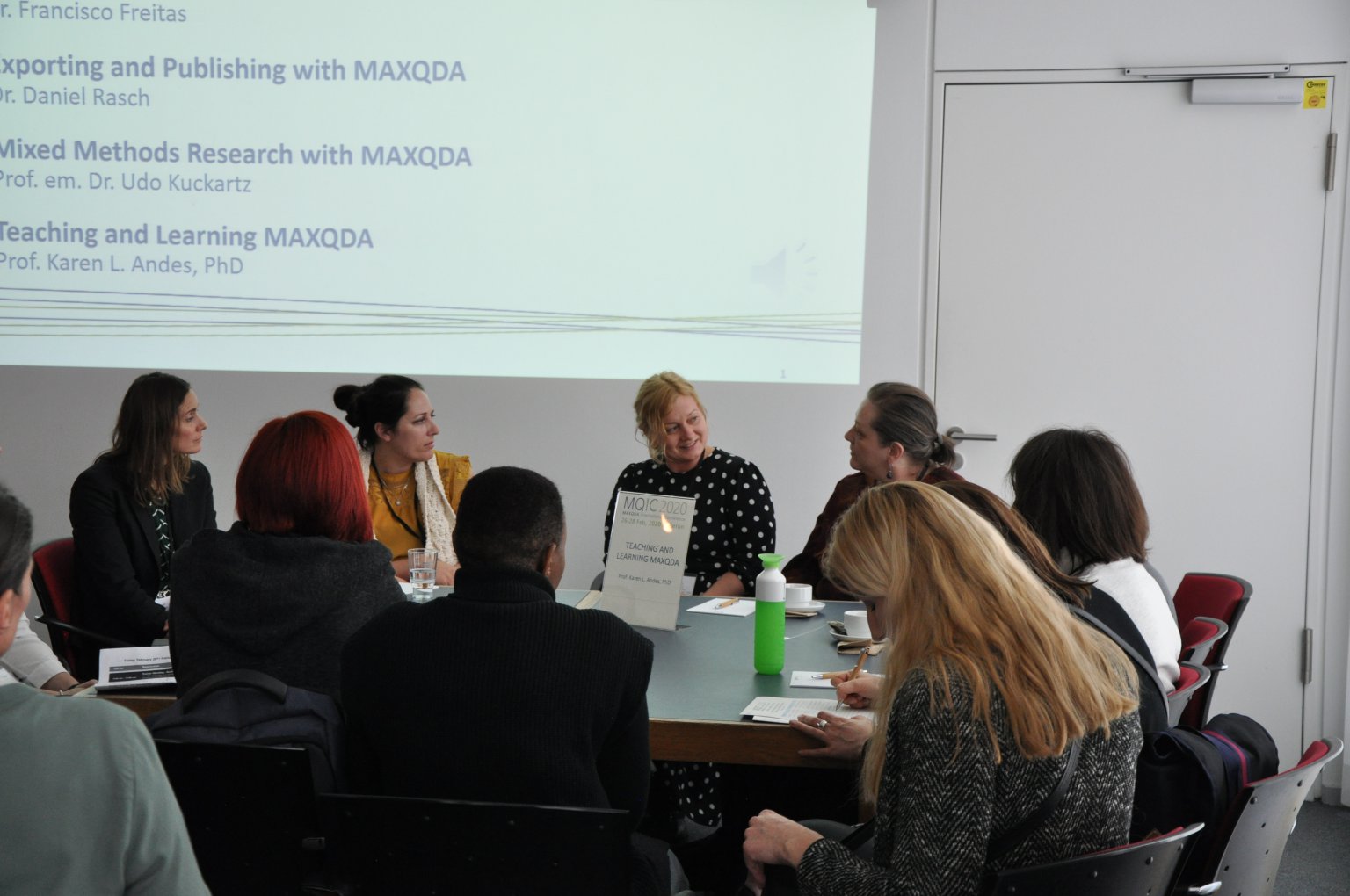
Exchanging ideas at the MQIC 2020 Best Practice Roundtables
Poster Session and Awards
The MQIC Poster Session is a favorite part of the conference for the team because it gives the researchers the opportunity not only to present their projects but also to win cash prizes, including the Best Poster Award. This year, there were a record number of 33 poster submissions, 21 of which were accepted and displayed throughout the duration of the entire conference. Topics ranged widely from teaching MAXQDA to a “Back to the Future” themed presentation on Strategic Foresight.
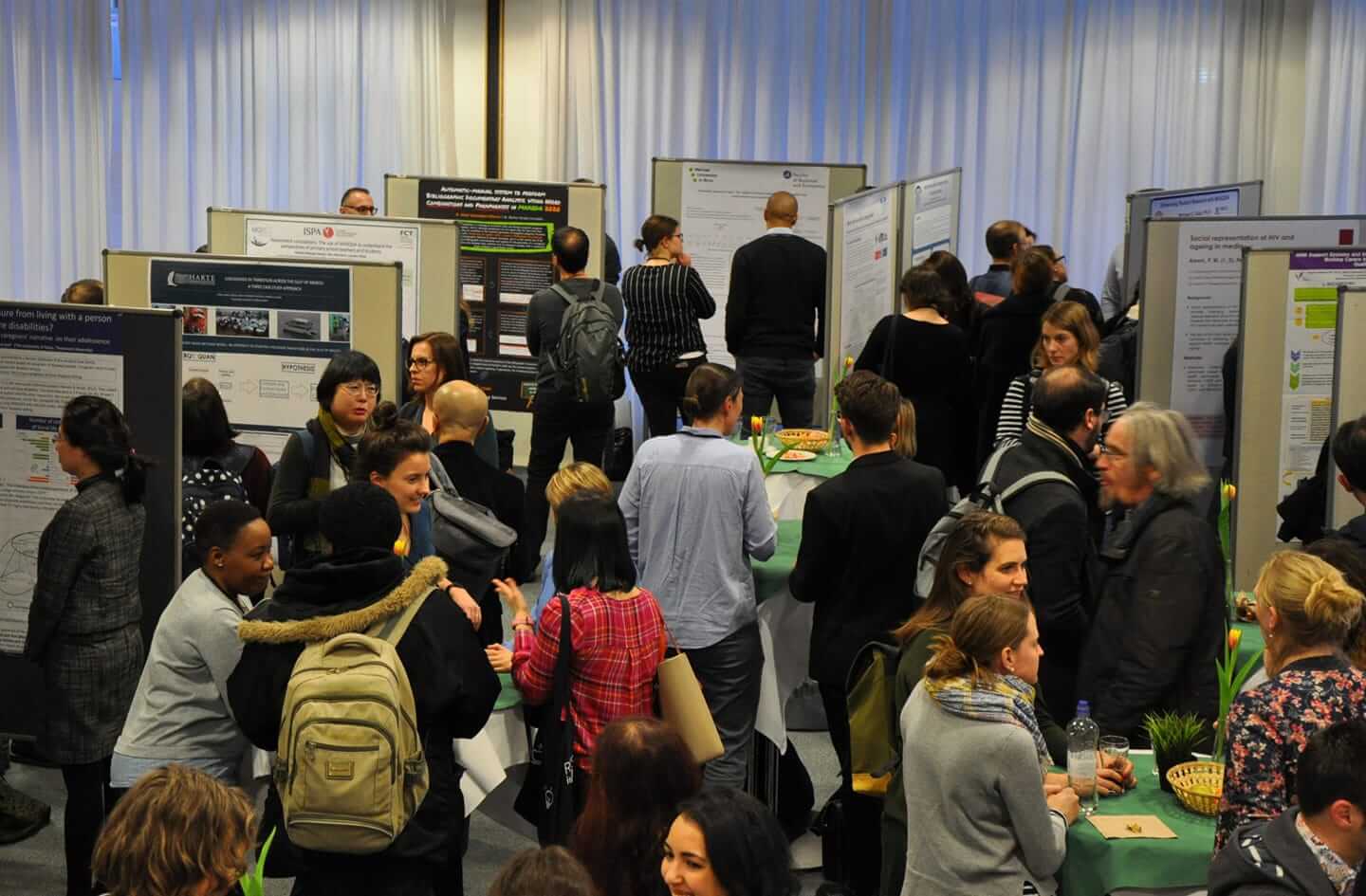
Research Examples at the Poster Session
Thank you to everyone who submitted this year, we could not have been more impressed by your posters! That said, one poster did stand out above the rest to receive the grand prize of €200 EUR and the coveted titled of Best Poster at the MQIC 2020. Congratulations again to qualitative data analysis consultant Dr. Antoni Casasempere Satorres and his research partner Dr. M. Vercher-Ferrándiz for their poster on “Automatic-manual system to perform Bibliographic Documentary Analysis. Using Word Combinations and Paraphrases in MAXQDA 2020”!
Dr. Casasempere Satorres’ poster was not only an extremely well-constructed explanation of word-based exploration with MAXQDA, but also a fascinating combination of manual and automatic analysis, which we found to be original, creative, and beautifully rendered. We were especially impressed with your convincing methodological presentation and focus on using MAXQDA. Thank you for sharing your expertise with us and we are delighted to have awarded you the grand prize!
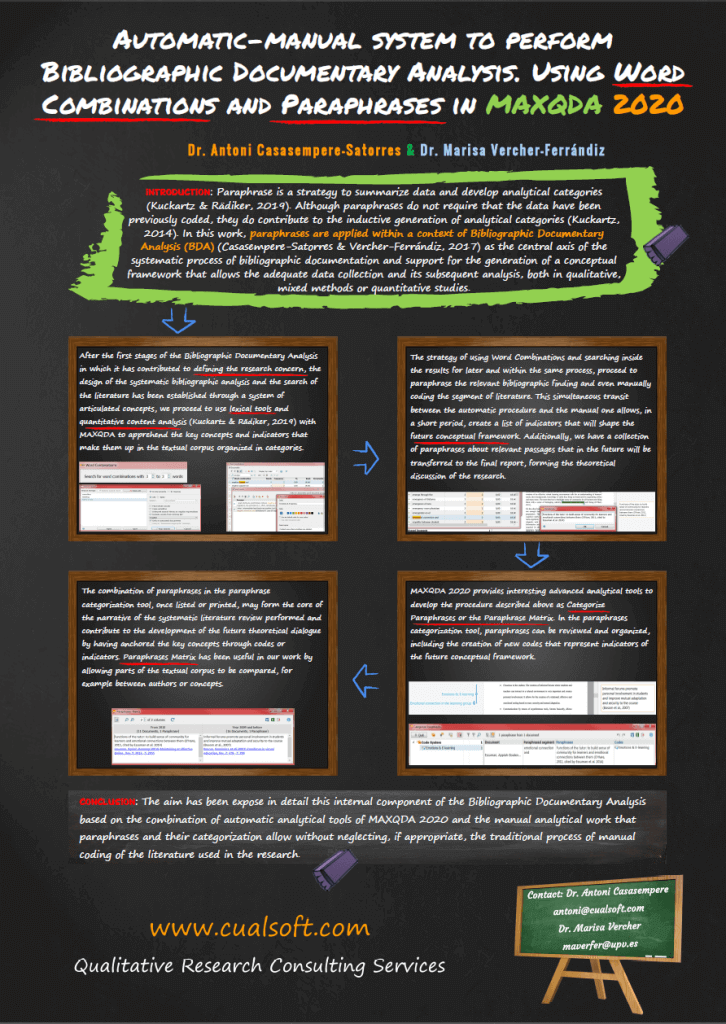
Automatic-manual system to perform Bibliographic Documentary Analysis.
Using Word Combinations and Paraphrases in MAXQDA 2020
by Dr. M. Vercher-Ferrándiz & Dr. A. Casasempere-Satorres
The award for second place went to Natalie Nóbrega Santos for her poster titled “Assessment conceptions in mathematics: The use of MAXQDA to understand the perspectives of primary school teachers and students”, and we had a tie for third place: Congratulations Teruyo Ishijima, Prof. Masahiro Nochi, and Prof. Yasuhiro Omi for their research poster titled “How are we getting pleasure from living with people with severe disabilities? An analysis of family caregivers’ narratives on their adolescence”, and to Michael C. Gizzi, Ph.D. for his teaching poster titled “Enhancing Student Research with MAXQDA”!
Special Event: Networking in a Futuristic Environment
How do we want to live in the future? This year’s special networking event took us to Berlin’s newest attraction, the Futurium. MQIC participants were able to explore the foreseeable, imaginable, and desirable drafts of possible futures in a tour through the museum followed by a networking dinner where specialties from regional and sustainable cultivation were served.
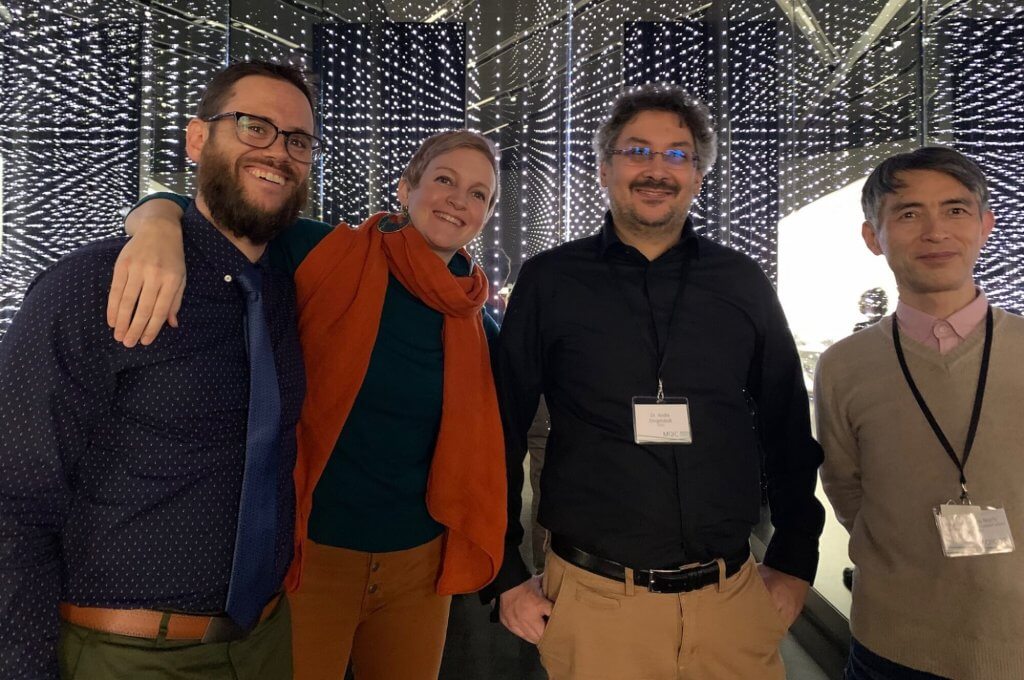

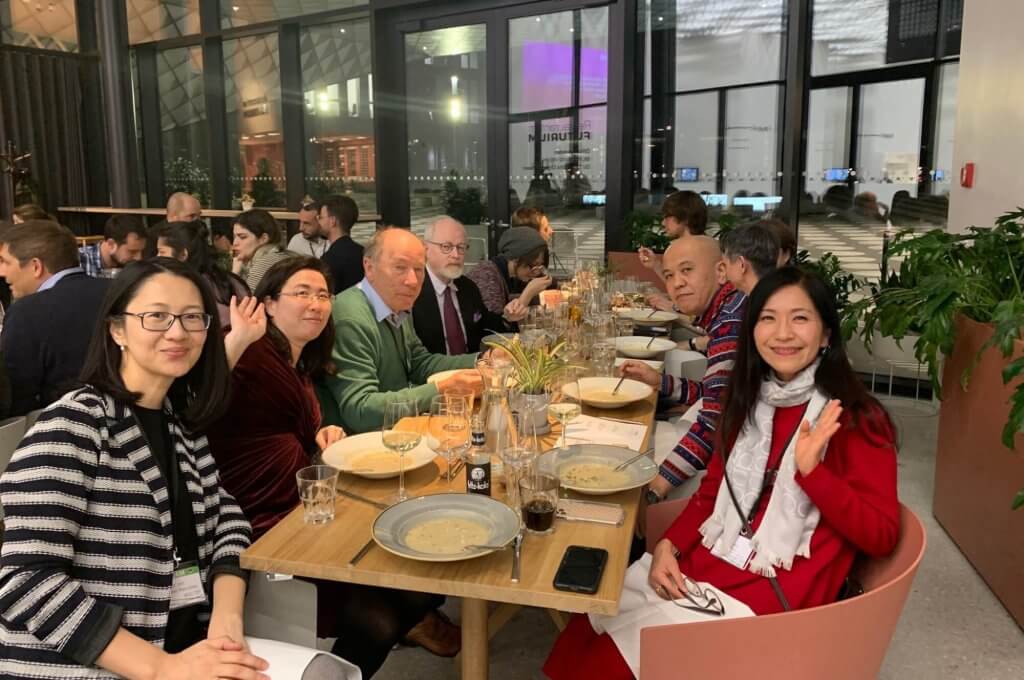
We had a great time getting to know all those who attended the special event and we can’t wait to see you all again next year! See even more great snapshots of these events and the MQIC here:
Stay tuned for MQIC 2021 Save the Date information coming soon and don’t forget to sign up for the MAXQDA Newsletter to make sure you always receive the newest MAXQDA updates right away:

